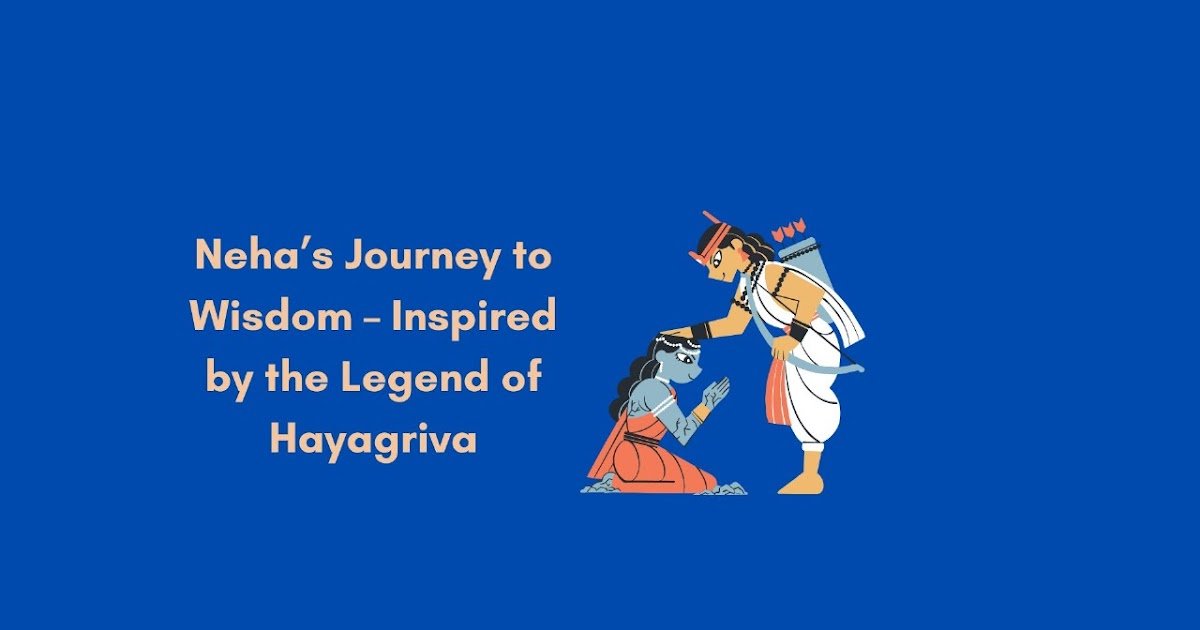Introduction
Neha, a driven professional, held a project management role at a well-regarded corporation. However, despite her unwavering commitment, she struggled to keep pace with the fast-evolving market dynamics and her mounting responsibilities. Attempts to enhance her skillset were frequently disrupted by looming deadlines and office politics, leaving her feeling stagnant and unable to advance.
One afternoon, she was tasked with a pivotal project that demanded a thorough grasp of data analytics, a discipline she had never studied formally. As she navigated through the intricate concepts, it felt as if she were submerged in a sea of complex algorithms and convoluted terminology. The pressure eroded her self-assurance, leading her to doubt her own abilities.
The Legend of Hayagriva
In numerous Vaishnavite families, children recite a prayer before their studies, signifying a profound respect for knowledge in Indian culture. While Lord Ganesha and Goddess Saraswati are commonly linked to education, Lord Hayagriva holds a special place in Vaishnavism as the divine embodiment of wisdom.
Who is Hayagriva?
Originating from Sanskrit—Haya (horse) and Griva (neck)—Hayagriva is depicted as a horse-headed form of Lord Vishnu. Though not listed among Vishnu’s ten principal incarnations, He is revered in the Sri Vaishnava tradition as the donor of knowledge.
The Mahabharata and various Puranas, including the Bhagavata and Skanda Puranas, recount His vital role in recovering the lost Vedas, solidifying His reputation as the deity of Learning and Wisdom.
The Legend of Hayagriva
In the Shanti Parva of the Mahabharata, a cosmic scenario unfolds where, following a great dissolution (Pralaya), Lord Vishnu lies upon cosmic waters, readying Himself for creation. A lotus blooms, and from it emerges Brahma, poised for His purpose.
From the water droplets of this lotus, two demons, Madhu and Kaitabha, appeared, symbolizing darkness (tamas) and desire (rajas). Upon spotting the powerful Vedas, they seized and concealed them in the ocean, rendering Brahma bereft of divine insight. In His plea for help, Vishnu materialized as Hayagriva, a brilliant, horse-headed entity.
The Cosmic Form of Hayagriva
Described in the Mahabharata, Hayagriva symbolizes the universe: His mane gleamed like the Sun, the heavens and the underworld served as His ears, the sacred rivers Ganga and Saraswati made up His hindquarters, and His eyes were the Sun and Moon. His divine form resonates with the Purusha Sukta of the Rigveda, illustrating the Supreme Being as the origin of creation.
The Retrieval of the Vedas
In His radiant form, Lord Hayagriva plunged into the sea where the demons had concealed the Vedas. While chanting the Samaveda, its celestial harmony drew Madhu and Kaitabha away, providing Hayagriva the opportunity to recover the texts and bring them back to Brahma.
As per the Mahabharata, He then manifested His divine presence in the northeastern ocean before reverting to His original form as Mahavishnu. The Hayagriva-Madhava Temple in Assam, referred to in the Kalika Purana, commemorates this tale.
The Defeat of Madhu and Kaitabha
Realizing their error, the demons hurried back but discovered the Vedas were missing. When they saw Vishnu resting on Shesha, they attacked Him. Awakened from His Yoganidra, Vishnu fought and defeated them.
The Mahabharata states, “Whoever hears this story daily shall never falter in their quest for knowledge.” (Shanti Parva, 347:76)
Hayagriva: The Eternal Source of Knowledge
This legend solidifies Hayagriva’s identity as the deity of wisdom. The Mahabharata tells of Galava, a Brahmana who attained mastery in Vedic recitation through worshiping Hayagriva. The Bhagavata Purana elaborates on this, associating Hayagriva with the unearthing of Shiksha, the Vedanga dedicated to phonetics.
Even during the period when the Vedas were concealed, Hayagriva never ceased to recite them, highlighting His enduring role as the eternal source of wisdom.
Hayagriva Jayanti and Its Significance
Hayagriva Jayanti, the day that celebrates the Lord’s recovery of the Vedas, coincides with Shravana Purnima, the same day as the annual Upakarma ceremony observed by the Rigveda and Yajurveda followers. Upakarma signifies the sacred thread-changing ritual, symbolizing a renewed commitment to Vedic studies.
In ancient India, following the Upanayana Samskara (initiation ritual), students would enter the Gurukula to learn the Vedas. The annual Upakarma event functioned as a reaffirmation of their commitment. The coincidence of Hayagriva Jayanti with this occasion accentuates the deep connection between the deity and the quest for knowledge.
Renowned Vaishnava saints and scholars like Nammalwar, Tirumangai Alwar, Kulasekhara Alwar, Yamunacharya, Ramanujacharya, Vedanta Desika, Madhvacharya, and Vadirajatirtha have composed hymns extolling the virtues of Lord Hayagriva. Many legends narrate how Hayagriva manifested as a white horse to accept offerings from His devotees.
Neha’s Transformation
Motivated by Brahma’s determination, Neha adopted a methodical approach to her studies rather than succumbing to feelings of despair. She enrolled in an online data analytics course, committing an hour each day to learning. Her hard work bore fruit—within weeks, she became proficient in data analytics, completed a successful project, and wowed her superiors with fresh, innovative perspectives. This dedication not only boosted her confidence but also propelled her career forward.
Key Learnings
Knowledge is Sacred – Similar to the Vedas, knowledge is vital for growth and should be cherished.
Persistence is Key – Conquering challenges demands continuous learning.
Guidance Matters – A mentor, akin to Neha’s grandfather, can direct us toward valuable resources.
Discipline Drives Success – Structured learning facilitates personal transformation.
Victory Over Ignorance – Much like Hayagriva, Neha triumphed over fear through knowledge.
Wisdom is the true treasure of life. Difficulties may challenge us, but determination, education, and mentorship can help us find our way to success. Like Lord Hayagriva, it is essential that we cherish and pursue wisdom—it is the cornerstone of advancement.

